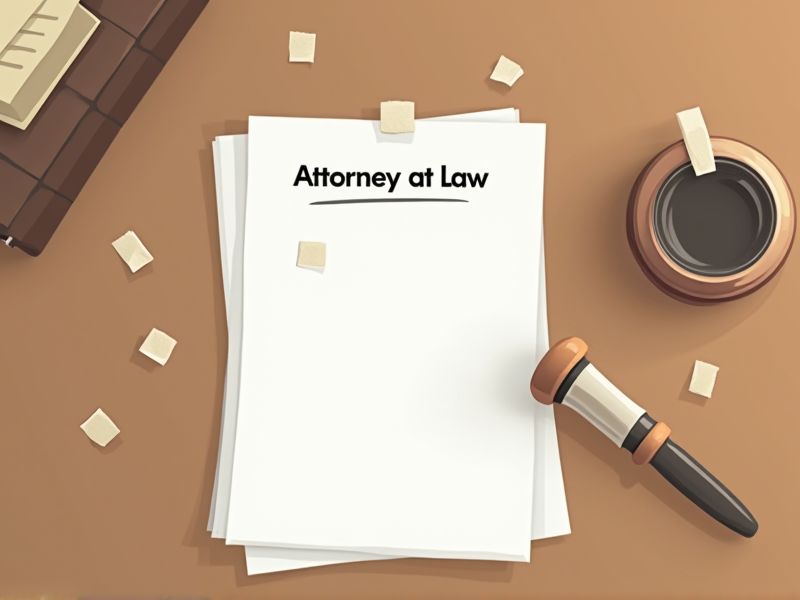
In the legal profession, certifications ensure attorneys possess specialized knowledge and uphold industry standards. Certifications in specific areas like patent law or mediation enhance an attorney's credibility and broaden their skill set. The legal system's complexity necessitates continuous learning, and certifications signal commitment to professional development. Important certifications you may need for Attorney at Law include the following.
Juris Doctor (J.D.)
Earning a Juris Doctor (J.D.) degree provides the comprehensive legal education essential for understanding complex laws and regulations. This degree ensures the development of critical thinking and analytical skills necessary for interpreting case law and statutes. The American Bar Association accredits J.D. programs, making them a required benchmark for sitting the bar exam in most states. Holding a J.D. signifies readiness to effectively represent clients and uphold legal standards in the courtroom.
State Bar Admission Certification
State Bar Admission Certification serves as a verification of an attorney's competence and understanding of legal principles. States aim to maintain professional legal practice standards and protect the public from unqualified practitioners. It ensures that attorneys adhere to ethical guidelines and demonstrate requisite legal knowledge. Mandatory certification fosters trust in the legal system by establishing a uniform standard for law practitioners.
Multistate Bar Examination (MBE)
The Multistate Bar Examination (MBE) measures a candidate's understanding and ability to apply fundamental legal principles across various areas of law. It provides a standardized metric that helps ensure consistency in evaluating competency levels among aspiring attorneys nationwide. By testing critical areas such as constitutional law, contracts, and criminal law, the MBE aids in identifying candidates who meet a minimum threshold of legal proficiency. States use the MBE to complement their specific bar exams in evaluating an attorney's readiness for practicing law.
Multistate Professional Responsibility Examination (MPRE)
The MPRE assesses a lawyer's understanding of professional conduct and ethics, which is crucial for maintaining the integrity of the legal profession. It ensures that attorneys have a standardized level of knowledge regarding their ethical obligations to clients, courts, and the public. Passing the MPRE is a prerequisite in almost all U.S. jurisdictions, reflecting its importance in the bar admission process. The exam helps prevent unethical practices by reinforcing the principles necessary for responsible legal practice.
Continuing Legal Education (CLE) Certificates
Attorneys need Continuing Legal Education (CLE) certificates to ensure they stay updated with the latest laws and regulations. Without ongoing education, legal practitioners risk falling behind in their understanding, which can affect their ability to effectively represent clients. States often require CLE credits to maintain licensure, ensuring a baseline of competency across the profession. CLE participation also fosters professional development and networking opportunities within the legal community.
Certificate in Legal Writing and Research
A Certificate in Legal Writing and Research equips attorneys with essential skills for drafting precise legal documents. Mastery in research techniques enables them to identify pertinent legal precedents and statutes efficiently. Enhanced writing proficiency aids in crafting compelling arguments for motions and briefs. Proficiency in these areas often correlates with higher client satisfaction and career advancement opportunities.
Certified Legal Manager (CLM)
Certified Legal Managers (CLMs) enhance law practice efficiency by integrating advanced management skills into legal settings. Their expertise in financial management, human resources, and strategic planning alleviates administrative burdens from attorneys, allowing for more focus on client representation. CLMs ensure regulatory compliance and streamline operations, reducing risks related to mismanagement. Law firms that employ CLMs generally experience improved service quality and client satisfaction due to better-organized legal practices.
Certified Mediator Credential
Attorneys seeking a Certified Mediator Credential often do so because it can effectively enhance their conflict resolution skills, leading to more efficient dispute settlements. Mediation training equips lawyers with techniques to facilitate negotiations, thus reducing lengthy litigation processes. Client trust and satisfaction frequently increase when attorneys demonstrate a commitment to peaceful resolutions. Credentialed mediators tend to attract more diverse cases, expanding potential client bases and marketability.
Certificate in Alternative Dispute Resolution (ADR)
Attorneys with a Certificate in Alternative Dispute Resolution can enhance their negotiation and mediation skills, directly affecting their efficiency in resolving conflicts outside of court. This certification broadens their expertise, leading to more client options for resolving disputes, which can lower costs and time involved in litigation. The legal landscape is shifting towards ADR methods due to increasing court backlogs, making this specialization pertinent for relevance and competitiveness. Clients increasingly value ADR-trained lawyers as such expertise aligns with the growing trend of businesses and individuals seeking less adversarial solutions.
Certificate in Intellectual Property Law
Specializing in intellectual property (IP) law enables an attorney to protect and enforce clients' rights over their creations and innovations, which clients increasingly demand due to rising competition and technological advancements. A certificate in IP law provides specialized knowledge and skills essential for navigating complex legal frameworks governing copyrights, trademarks, patents, and trade secrets. Possessing this certification can offer a competitive edge when seeking employment opportunities, as firms value attorneys who bring niche expertise and can address specific client needs. The global economy's reliance on intellectual assets necessitates attorneys with the capability to manage and litigate IP issues effectively.
Summary
You, as a reader, can expect increased confidence in an attorney's specialized skills when they obtain relevant certifications. These credentials often lead to a stronger reputation, potentially attracting clients seeking expert legal guidance. Certification also indicates a commitment to continuing education, reflecting updated knowledge in legal practices. As a result, attorneys often experience expanded career opportunities and professional growth.
